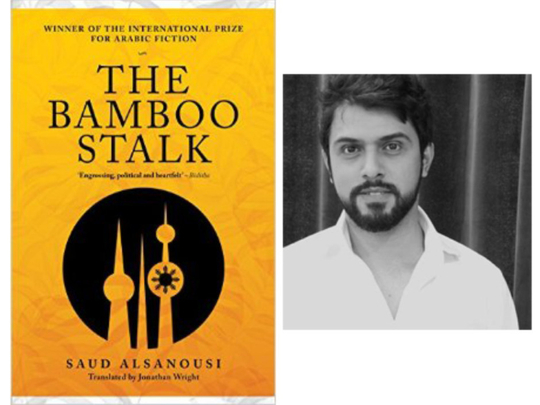
Saud Alsanousi, a Kuwaiti novelist and journalist, has made a contribution in world’s literature through his fiction narrative The Bamboo Stalk. Other creations of this writer are the novel The Prisoner of Mirrors, and the short story, The Bonsai and the Old Man. The Bamboo Stalk, however, won the International Prize for Arabic Fiction in 2013.
The book cover depicts the buildings found in Kuwait and Philippines. The title of the novel allures the audience and evokes curiosity about an exotic plant. The Bamboo Stalk reflects the item with which the main hero compares himself. Bamboo thrives in every place it is planted, deepening new roots, though this vegetation has neither a past, nor a memory. The narration depicts the painful experience of Jose, who discovers this difference between a human being and the bamboo stalk.
The story consists of five parts subdivided into several chapters. The narration attracts the readers from the first lines, as it doesn’t have any introduction. It presents a fascinating story of Jose’s life, as he is also known as Isa. He is unique, born to Josephine, a love-struck Filipina maid, and Rashid, a liberal-minded Kuwaiti novelist, who got into a relationship when she was working in his family’s house. Therefore, the events of this book take place in Kuwait and the Philippines.
Among the other principal characters of the story are: Jose’s aunt Aida; Josephine’s sister, an ambitious former call girl; Jose’s grandfather Mendoza, who is very strict and suffers from trauma from the Vietnam War; Rashid’s mother and Jose’s grandmother Ghanima, a widow, who also has three daughters; Ghassan, Rashid’s best friend, who seeks Jose and brings him back to Kuwait; and Jose’s hostile aunt Nouria, who arranges for him to be sacked and for his allowance to be cut off.
The events of the story attract the reader’s attention and they empathise with the principal characters. The primary themes of the narration are cross-cultural identity and belonging. Jose has been searching for his single name, the only religion and homeland where the main hero belongs, all throughout the story. Finally, the boy has realised his own unique identity that combines the peculiarities of his parents. The main character has come to the conclusion he is Kuwaiti-Filipino, Jose Mendoza and Isa Al-Tarouf, with Christian, Muslim, and Buddhist religions.
In addition, the book highlights such themes as the plight of migrant workers, their financial and emotional states, family relationships, human struggle for life, and hope for better changes. These issues appeal to readers’ emotions and enlighten the vital problems that deserve attention. Moreover, presentation of such important themes through fiction emphasises the author’s style.
The book is translated into English by Jonathan Wright and thanks to simple vocabulary, is accessible to a broad audience.
Talented and skilled, Josephine sacrifices herself to become her family’s main bread earner. Jose explains his “grandfather saw her as the perfect alternative source of income for the family, a guarantee of its survival.” Thus, he suggests that his younger daughter become a call girl like her sister, who couldn’t work because she had a child.
Although the heroine didn’t want to lead such a life, she accepted and tolerated the rude behaviour of the “strict and neurotic” mistress. Thus, Josephine and Jose are considered to be strong characters in this story, while Ghanima, with her three daughters, are weak.
The novel leads the readers into deeper comprehension of such characters’ inner world. Having been good-natured, Josephine wasn’t angry with Ghanima. Moreover, she dreamed about a better life for her son and made him believe in it. Josephine influenced Jose, thus he stayed gentle and forgiving, even when he was driven out of his own country.
To sum up, The Bamboo Stalk’s motivation is different from searching for a better life in a rich country. The happiness of the main character is at stake. He has to choose between a hard life with his rich family in Kuwait, or a poorer one in the Philippines, which is what he eventually selected.
The book presents Alsanousi’s mastership in portraying the societies of both countries and their common family atmospheres. This work is full of sophisticated scenes that deserve attention.
— The writer is a student at the American University of Sharjah. Read more student work at 360 Newsbeat.








